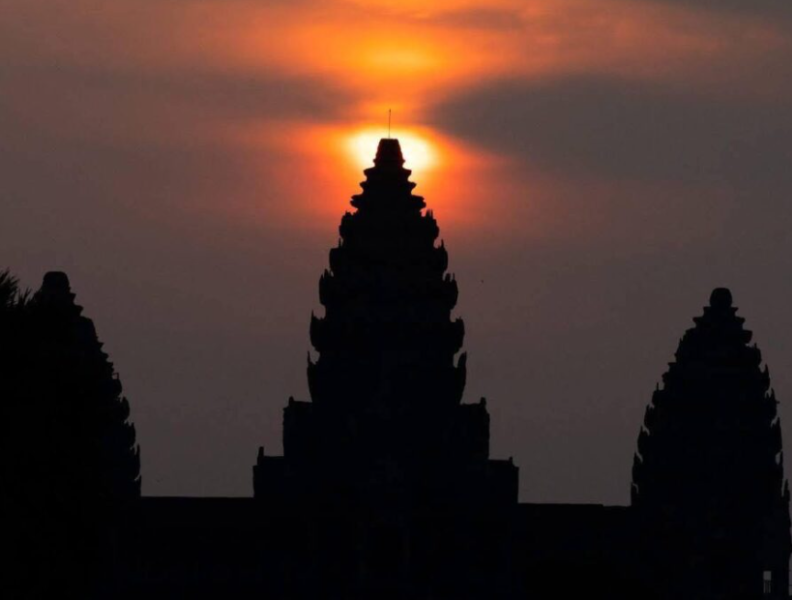-
Posts
36,760 -
Joined
-
Last visited
-
Days Won
5
Content Type
Events
Forums
Downloads
Quizzes
Gallery
Blogs
Everything posted by CharlieH
-
a30baa2a14de8cf3f86270f34e822a25.mp4
-
Soumdtrack in Thai, but visual is good illustration of the venue. 100bt entrance fee and that's redeemable against purchase of coffee etc. Looks like an interesting and different place to visit. 5152d7796f24edcda565eba700756e25.mp4
-
a78030d6b7c979ee7f9cc2933ea95d0f.mp4
-
04110773fb1bc1572a5319159fd8a00d.mp4
-
- 1
-

-
-

What makes people choose to live in bad air?
CharlieH replied to hotsun's topic in ASEAN NOW Community Pub
Usual situation: NO real enforcement, NO real consequences to an action, so there won't be any significant change. That applies to almost EVERYTHING in this country. Too many snouts in the trough. -
Maria Kovalchuk, a 20-year-old Ukrainian OnlyFans model, has survived a horrifying ordeal after being found dumped by a roadside in Dubai with multiple broken bones and a shattered spine. Missing for ten days, Maria was last seen heading to a party on March 9, reportedly invited by two men posing as modeling agents. She missed her scheduled flight to Thailand two days later, sparking panic among her family and friends. Maria was discovered on March 19 in critical condition, unable to speak and without identification or her phone. She has undergone four surgeries and remains hospitalised. Her mother, Anna, who flew from Norway to be by her side, expressed cautious optimism about Maria’s recovery, stating, “She is getting medical treatment and everything will be all right.” Dubai police claim Maria entered a restricted construction site alone and fell from a height. However, her family disputes this explanation, calling it “fake” and suspecting foul play. Russian media outlets have raised concerns that Maria may have been lured into sexual exploitation schemes under the guise of glamorous opportunities. The term “Sheikh parties” has emerged in discussions—events where young women are allegedly paid for degrading acts with wealthy men. Maria’s case has drawn attention to the darker side of Dubai’s influencer scene. Reports suggest she may have been targeted for one of these so-called “Porta Potty” parties, notorious for exploiting models and influencers. While Dubai police deny these claims, the incident has ignited debates about the safety of young women navigating international modeling opportunities. The Ukrainian consulate in Dubai is closely monitoring the investigation alongside Maria’s family and legal representatives. As questions mount over what truly happened to Maria during those ten days, her story serves as a stark reminder of the risks faced by models abroad—a world promising glamour but often hiding dangerous shadows. Based on a story from Daily Mail 26-03-2024
-

Healthy and sustainable diet? - Heres How !
CharlieH replied to CharlieH's topic in The Wellness Zone
Off topic posts removed. -

UK banking apps DOWN!
CharlieH replied to CharlieH's topic in Jobs, Economy, Banking, Business, Investments
Thanks to all for feedback. on various banks. CLOSED -

UK banking apps DOWN!
CharlieH replied to CharlieH's topic in Jobs, Economy, Banking, Business, Investments
Thanks to those commenting, maybe whatever the issue was has been resolved. -
55b8b7447ff30d640bebb121746c6741.mp4
-
Motorbikes are a popular way for digital nomads to navigate Southeast Asia, especially in Thailand. However, many travel insurance plans exclude motorbike accidents, leaving many riders vulnerable to high medical costs. SafetyWing Nomad Insurance offers comprehensive coverage, ensuring nomads stay protected in case of an accident. The risks of riding a motorbike in Thailand Thailand’s roads can be dangerous, particularly for foreigners unfamiliar with local traffic laws. In 2020, motorbike accidents accounted for 74 to 85% of road fatalities, with over 22,000 reported incidents. Factors like reckless driving, poor road conditions, and lack of experience contribute to these risks. Beyond physical danger, motorbike accidents can lead to massive expenses. Severe injuries may require costly surgeries or long hospital stays, with emergency evacuations exceeding US$50,000. Riders may also face legal and liability issues if they injure someone or damage property. How SafetyWing protects you SafetyWing Nomad Insurance provides essential coverage for digital nomads who rely on motorbikes. The plan includes: Medical expenses: Up to US$250,000 for hospital bills, surgeries, and medication. Emergency evacuation: Up to US$100,000 for transport to better-equipped hospitals. Personal liability: Covers up to US$25,000 for legal claims and property damage. Accidental death & disability: Financial support for severe injuries or fatalities. Coverage conditions To qualify for coverage, riders must: Have a valid motorcycle license (including an International Driving Permit if required). Wear a helmet and safety gear. Avoid reckless behaviour, including riding under the influence. Why choose SafetyWing? Unlike many insurance providers, SafetyWing includes motorbike accident coverage as part of its standard plan. Benefits include: Worldwide protection: Coverage in 180+ countries. Flexible sign-up: Policies can be purchased anytime, even after starting a trip. Automatic renewals: Continuous coverage every 28 days without gaps. No hidden restrictions: Covers all engine sizes, provided traffic laws are followed. Don’t risk high medical bills or legal trouble, protect yourself with SafetyWing Nomad Insurance. Sign up online in minutes and travel worry-free. Explore their coverage plans here. Sponsored – Original article by The Thaiger
-

NEW payment system- Tagthai
CharlieH replied to CharlieH's topic in Jobs, Economy, Banking, Business, Investments
https://www.tagthai.com/explore/p/payment-for-foreign-tourist-in-thailand? Have a read! -
b822f460acf5b25a878a420af12223de.mp4 Is this the best ? Do you know anywhere better? Add your favorite below....
-

NEW payment system- Tagthai
CharlieH posted a topic in Jobs, Economy, Banking, Business, Investments
977004d02e333c1165f11e9e603aab02.mp4 https://www.tagthai.com/explore/p/payment-for-foreign-tourist-in-thailand? Many visitors and tourists alike have been wanting this for awhile, now it's arrived. New Payment System 'Tagthai' Introduced for Tourists in Thailand Thailand has launched 'Tagthai,' a new payment system designed to facilitate financial transactions for tourists without the need for a local bank account. The system requires only a passport for registration and is accessible via a smartphone application, provided users have an active data connection. Currently, top-up facilities for the service are limited but are expected to expand as the system gains traction. While primarily targeted at tourists, 'Tagthai' may also appeal to expatriates and residents concerned about banking security. The introduction of this system reflects Thailand's ongoing efforts to enhance the convenience and safety of financial transactions for visitors, promoting a more seamless travel experience. -
7b2ccfcc9c9566d8901299acc8b87376.mp4
-
- 2
-

-
The Equinox event at Angkor Wat, from Friday to Sunday, attracted an impressive 85,453 visitors, highlighting the site’s continued popularity as a cultural and historical landmark. According to the Apsara National Authority (ANA), among the attendees were 14,233 foreign tourists who travelled from around the world to witness the stunning sunrise over the central peak of the iconic Angkor Wat complex. The Equinox Angkor is one of the most spectacular events attracting both international tourists and local Cambodians, took place from Friday to Sunday, between 5am and 6:30am. The Equinox Angkor event demonstrates the unique characteristics of the Khmer ancestors, deliberating design of Khmer architecture; the layout for constructing the temple; land arrangement; calculations based on astronomy and consideration of the celestial course along with beliefs and natural phenomena requirements, which creates a phenomenon that shines at the centre of the Angkor Wat temple. The equinox is the time when day and night are approximately equal in length, unlike some normal months, the night is longer than the day or the day is longer than the night that always happens in the world. This special sunrise event occurs twice a year, in March the spring or Vernal Equinox and in September the Autumnal Equinox. Courtesy of Khmer Times
-
In the same time it takes to fill your tank with Petrol ! While electric cars might appeal to eco-conscious commuters, the fear of running out of charge before your destination is a big turn-off for many. But now, the Chinese EV maker BYD claims its latest vehicles will bring an end to 'range anxiety'. BYD says its new charging system, dubbed the 'Super-E Platform', can enable a car to travel 250 miles (400km) after just five minutes of charging. This 1,000-kilowatt (kW) charger – twice as powerful as the rival Tesla Supercharger – can recharge an EV battery in the same time it takes to fill a petrol car with fuel. Last year, BYD was the world's second largest manufacturer of battery-powered electric vehicles only just behind Elon Musk's Tesla. However, this latest innovation could catapult the Chinese company into the top position by tempting buyers reluctant to give up their conventional petrol cars. BYD founder Wang Chuanfu, often described as China's Elon Musk, said at a launch event in Shenzhen, China that the company's new cars would achieve 'oil-electric parity' for refuelling. Mr Wang added: 'In order to completely solve our users’ charging anxiety, we have been pursuing a goal to make the charging time of electric vehicles as short as the refuelling time of petrol vehicles.' According to BYD, the new ultra-fast charging technology will initially be available in two new vehicles, the Han L sedan and Tang L SUV, which were launched this year. Both the Han L sedan and the Tang L SUV start slightly cheaper than the average price of an EV in the UK, costing between 270,000 and 350,000 yuan ($37,300-$48,350 or £28,700-£37,300). The company claims these cars' new battery architecture will allow drivers to add up to 1.20mile (2km) of range for every second of charging at peak rates. Officially rated as '10C', this means the vehicles can fully charge within a tenth of an hour, or six minutes. Charging so fast requires transferring a lot of electrical power, which means creating a very high voltage and a very large current at the same time. The biggest barrier to increasing charging power is that big currents create a lot of heat which can be dangerous when it builds up in a large battery. To get around this problem, BYD says it has managed to reduce the internal resistance of the battery, meaning that the battery creates less heat when currents pass through it. Additionally, the company says it has created new silicon carbide power chips, which will be able to withstand the higher voltages. In a post on the Chinese social media platform Weibo, translated via Google Translate, the company says: ‘BYD officially releases flash charging battery with ultra-high voltage of 1000V, ultra-large current of 1000A and ultra-large power of 1000kW.' Speaking at the launch event Mr Wang added: 'This is the first time in the industry that the unit of megawatt has been achieved on charging power.' This power level doubles or even triples the capacity of most charging systems available in the UK and the US. Tesla's latest generation of Superchargers are capable of hitting 500 kW, but the vast majority of older Superchargers top out between 250 and 400 kW. Most of Tesla's Superchargers in the UK provide enough charge to drive 172 miles (277km) after 15 minutes of charging. BYD says it plans to install a network of 4,000 'flash-charging stations' across China. More powerful charging stations require direct access to the electrical grid as well as specialised cooling systems to prevent overheating. This means the new flash-charging network may also require the creation of more infrastructure including the construction of additional sub-stations and transformers. r has seen more than $800 billion (£617bn) wiped from its stock market valuation
- 1 reply
-
- 1
-

-
Earth's glaciers 'will not survive the 21st century' scientists warn - as five of the past six years have seen the most rapid glacier retreat on record Earth's 275,000 glaciers currently store around 70 per cent of the world's freshwater and are relied on by almost two billion people. But to mark World Glacier Day on Friday, scientists now warn that glaciers in many parts of the world 'will not survive the 21st century'. A report from the World Meteorological Organization (WMO) found that five of the last six years have seen the fastest glacier retreat on record. As this melting releases vast quantities of water, experts warn that 10 million people around the world are now at risk of devastating glacial floods. Since records began in 1975, glaciers have lost more than 9,000 billion tonnes of mass - equivalent to a layer of ice as big as Germany and 15 miles (25km) thick. While this loss has been moderate in areas such as the Canadian Arctic or Greenland, some areas have been hit significantly harder. In Europe’s Alps and Pyrenees, glaciers lost 40 per cent of their mass between 2000 and 2023 alone. WMO Secretary-General Celeste Saulo says: 'Preservation of glaciers is a not just an environmental, economic and societal necessity. It’s a matter of survival.' Naturally, glaciers shrink during the warm summer months and grow larger with compacted snow which falls over the winter. This process has kept Earth's current glaciers stable throughout the seasons for tens or hundreds of thousands of years. However, since humans began introducing large amounts of CO2 and other greenhouse gases into the atmosphere, this balance has now been disturbed. A warming climate, which scientists have conclusively linked to human activity, means that glaciers melt faster in the summer and recover slower in the winter. During 2024, the world's glaciers lost 450 billion tonnes of mass as they shrank - the fourth-worst year on record. In that same period, glaciers in Scandinavia, Svalbard and North Asia saw their greatest annual loss on record. According to the WMO's research, the period between 2022 and 2024 was the largest three-year loss of glacier mass ever recorded. A recent study found that glaciers are now retreating so fast that they release an average of 273 billion tonnes of water every year, or 6,542 billion tons between 2000 and 2023. FULL STORY
-
Health insurance can be a lifesaver until your claim gets denied. In Thailand, research shows that 85% of insurance claim rejections happen due to simple, preventable mistakes. Whether you're a long-term expat or a frequent visitor of the Kingdom, knowing how to manage your health insurance claims can save you time, money, and frustration. Why health insurance claims get denied in Thailand 1. Missing or incorrect documentation Simple paperwork mistakes are the most common issue, such as: No diagnosis or unclear treatment descriptions Unitemised bills Missing doctor’s name or hospital stamp 2. Ineligible or uncovered treatment Claims are denied if: Your policy expired The treatment falls under a waiting period The condition isn’t covered 3. Procedural mistakes Common slip-ups include: Filing late Duplicate submissions Misspelled names or incorrect policy numbers Skipping pre-authorisation 4. Coding errors Incorrect medical billing codes or treatment codes can confuse insurers and result in partial or denied reimbursements. 5. Exclusions Services that exceed policy limits or fall under exclusions, such as pre-existing conditions, may not be covered, leading to a claim denial. Similarly, claims may also be denied if the insurer determines that the treatment or service was not medically necessary. How to prevent health insurance claim rejections Be sure to stay consistent with how and when you file your records. It may help to build a claims checklist and keep records of: Previous claims Medical certificates Receipts and policy numbers Confirm coverage before visiting the doctor Check your coverage status, make sure your treatment is included, and ask if pre-authorisation is needed, especially for surgeries or specialist visits. Network hospitals and clinics of your health insurance providor will know how to handle insurer paperwork and can help process claims faster, often through direct billing. Remember to ask for: Full medical reports Bills with service breakdowns Translated documents if they’re in Thai It may also be wise to keep them safe and backed up digitally. Don’t delay your submission Always submit within the 30-day window after treatment. The sooner, the better. And remember to triple-check everything. One type can cause weeks of delays. Before submitting, verify your: Name and policy number Medical codes Dates and receipts Use tech to your advantage Online claim submission: Most insurers now offer online claim forms—quicker, cleaner, and fewer mistakes. Track claims in real-time: Use your insurer’s portal or app to check claim status and get alerts if something is missing. Automated coverage checks: Some platforms instantly check if your treatment is eligible before you even visit the hospital. Choose your insurer wisely When choosing your provider, look for: Transparency: Pick a provider that clearly explains policies, avoiding any confusion around the claims process. Strong hospital networks: Wider coverage means easier direct billing, shorter wait times, and less paperwork. Responsive support: Choose insurers with multilingual support teams who respond quickly and actually help when you’re in a pinch. For expats in Thailand, Cigna health insurance remains a top choice not only for their responsive support and strong hospital networks, but their comprehensive and tailored plans also provide world-class care. Coverage includes: Hospital stays: Coverage up to $1,000,000 annually for major health conditions. Doctor visits: Up to $25,000 per year for check-ups and specialist care. Chronic illness care: Full coverage for long-term treatments. Emergency evacuation: Global emergency assistance. Preventive care: Screenings, vaccinations, and routine check-ups to detect and manage health issues early on. Custom add-ons: Additional coverage for dental, vision, or maternity care. Getting your health insurance claims approved in Thailand doesn’t have to be stressful. With a little planning, attention to detail, and the right insurer, you’ll avoid costly denials and get the coverage you deserve.
-
1. Choosing the Right Location: Bangkok: Neighborhoods like Sukhumvit, Sathorn, and Thonglor are popular among expatriate families due to their proximity to international schools, parks, and entertainment venues. Suburban areas such as Bang Na and Nonthaburi offer more affordable housing while remaining accessible to the city centre. Chiang Mai: Known for its mountainous scenery and relaxed atmosphere, Chiang Mai provides a quieter lifestyle with a growing expatriate community. Phuket and Koh Samui: These islands offer beachside living with modern amenities, suitable for families seeking a resort-like environment. 2. Securing Appropriate Visas: Thailand offers various visa options for families, including Non-Immigrant O visas for dependents and education visas for children enrolled in Thai schools. It's essential to consult the Thai E-visa website or contact the Thai embassy in your home country to determine the specific visa requirements and application procedures. 3. Exploring Housing Options: Initial Accommodation: It's advisable to book temporary housing through platforms like Airbnb or serviced apartments upon arrival. This allows families to explore neighbourhoods firsthand before committing to a long-term lease. Long-Term Rentals: In cities, contacting building management directly can lead to available units. In smaller towns, roadside signs often advertise houses for rent. 4. Navigating the Healthcare System: Thailand boasts a robust healthcare infrastructure with numerous private hospitals catering to expatriates. Facilities like Bumrungrad International Hospital and Bangkok Hospital are renowned for their services. Costs can get high though it will benefit you to have the insurance coverage that Cigna would provide. 5. Understanding the Cost of Living: The cost of living in Thailand is relatively affordable compared to Western countries. Approximate monthly expenses include: Housing: $300 to $800 (about 10,182 to 27,153 Thai baht) for a condominium. Utilities: $50 to $100 (about 1,697 to 3,394 Thai baht). Food: $2 to $10 per meal (about 68 to 339 Thai baht), maybe more if you eat more expensively. Transportation: $1 to $3 (about 34 to 102 Thai baht) for local trips; $10 to $20 (about 339 to 679 Thai baht) for intercity travel. 6. Embracing Thai Culture: Integrating into Thai society involves understanding and respecting local customs. Key cultural aspects include: Respect for the Monarchy: The Thai royal family is deeply revered, and it's important to show respect in all references. Greetings: The traditional Thai greeting, the "wai," involves placing your palms together at chest level and bowing slightly. Dress Code: Modest clothing is appreciated, especially when visiting temples or formal settings. 7. Enrolling in Educational Institutions: Thailand offers a plethora of international schools following various curricula, including British, American, and International Baccalaureate. There are countless institutions in Thailand that you can find but the major ones can be found in the more popular and bigger cities like Bangkok, Phuket, Chiang Mai, and Pattaya for example. 8. Managing Finances: Opening a local bank account facilitates financial transactions. Most banks require a valid passport and visa for account setup. Banks like Bangkok Bank and Siam Commercial Bank offer services tailored for expatriates. 9. Transportation and Commuting: Urban Areas: Cities like Bangkok have extensive public transportation systems, including the BTS Skytrain and MRT subway, offering efficient travel options. Rural Areas: In less urbanised regions, personal vehicles or motorbikes are common modes of transport. Obtaining a Thai driving license is necessary for legal driving. 10. Building a Support Network: Engaging with expatriate communities can ease the transition. Online forums, local clubs, and social events provide platforms to connect with fellow expatriates and share experiences. 11. Addressing Potential Challenges: Language Barrier: While English is widely spoken in tourist areas, learning basic Thai phrases can enhance daily interactions and demonstrate cultural respect. Cultural Adjustment: Adapting to a new culture requires patience and openness. Embracing local customs and traditions facilitates smoother integration. Traffic Conditions: Major cities often experience traffic congestion. Familiarising oneself with public transportation options can mitigate commuting challenges. 12. Employment Opportunities: Foreigners can work in Thailand in specific sectors such as education, technology, and hospitality. Platforms like JobsDB and LinkedIn list available opportunities. Securing a valid work permit is essential for legal employment. 13. Legal Considerations: Understanding local laws and regulations is crucial. For instance, certain actions considered minor elsewhere might be significant offences in Thailand. It's advisable to familiarise oneself with local legal norms to avoid inadvertent infractions that you may commit. Laws change often so it is important to keep up to date with official sources so you will not be caught off guard. Moving into Thailand is open to a lot of issues especially when moving with an entire family. With 2025 ongoing right now, a lot has changed and will change for the rest of the year. With that in mind, it is best to ensure that you and your family are insured to alleviate any challenges that may come. You can check out the plans Cigna’s plans HERE.
-
Something Ive never been too, as soon as I see "soapy" you kinda know whats coming, literally...lol
-

Exactly what happens in a man's brain during SEX
CharlieH replied to CharlieH's topic in ASEAN NOW Community Pub
You're ok they are referring to Bob there...... -
In 20 years, I've never seen the term "nuad Thai," used anywhere! So I dont see any danger of that being misrepresented. Every shop I have ever seen or used just states "Thai massage" where from my experience, you're twisted like a pretzel with absolutely no thought or consideration given to contraindications, general health questions, etc. Probably shown what to do by the girl in the next cubicle when it's quiet. Zero actual knowledge of anatomy and physiology in most places. There may well be "legitimate" and correctly trained ones out there, but I suggest they are few and far between compared to the "happy ending" variety.
- 86 replies
-
- 26
-

-

-

-

-

-

-
Wellness in 2025: Emerging Trends to Watch The wellness industry has skyrocketed, reaching £4.9 trillion with 2024 marking unprecedented innovations. As we move into 2025, new developments promise to reshape health and wellbeing. Preventative Medicine Goes Mainstream Preventative healthcare is the buzzword, focusing on holistic approaches to stop illnesses before they start. Dr. Samantha Decombel emphasizes the shift from reactive to proactive care, with at-home tests and comprehensive clinics becoming popular. However, this trend highlights gaps in public healthcare, necessitating individual responsibility for health. AI Coaches and Therapists Rise AI is revolutionising wellness with AI-powered therapists and personal trainers offering data-driven insights. While AI can't replace human empathy, it makes therapy more accessible, bridging gaps in traditional healthcare. Hydration and Health Drinks Surge Hydration goals dominate social media, and 2025 will see a boom in specialty health drinks. From collagen to gut health beverages, expect a vast array of options. But beware—healthy labels can be deceptive, so always check ingredients. Longevity and Cellular Health in Focus This year, longevity supersedes anti-ageing. Biohacking trends like infrared saunas and diet changes gain popularity for promoting long life. Mitochondrial health, central to energy and disease prevention, is also in the spotlight. Personalised Health Routines Prevail With wearable tech and bespoke testing, personalised health plans are all the rage. Understanding unique health needs ensures safer choices and optimizes wellbeing. Natural Ingredients and Gut Health Gain Attention The shift toward whole, organic foods continues, avoiding ultra-processed ingredients. Gut health, linked with multiple bodily functions, will see advancements in research, focusing on the gut-brain axis and hormonal effects. High-Performance Lifestyles Adopted Wellness takes a competitive turn with high-performance lifestyles. Sleep, stress, and recovery tracking become mainstream, inspired by elite athletes' routines to improve everyday health. 2025 looks set to redefine wellbeing, with trends that encourage proactive, informed, and personalised approaches to health.
.png.3b3332cc2256ad0edbc2fe9404feeef0.png.8488ab72b8bb2e508209bfe3211b6e08.png)





.webp.812e89489ce59f1a752f99ff7738f713.webp)
.webp.a0ab472cc21f146de99ee7a949d5b7ad.webp)



.webp.5dd0b9216d0aaf0eb8a175215fbf94b1.webp)
.webp.6bd66cf48834ef64eb2d4bd8e83fa052.webp)
.webp.14efaaef6af690c3f00afb8605441efe.webp)